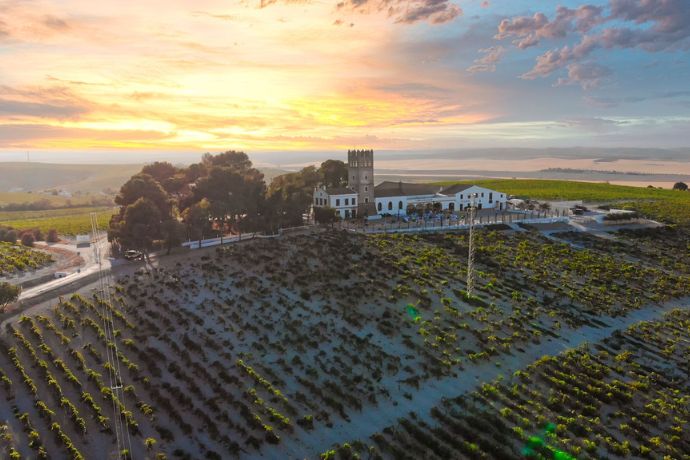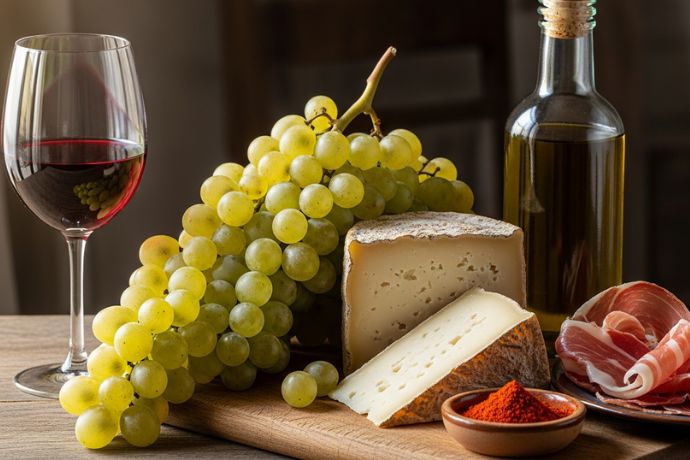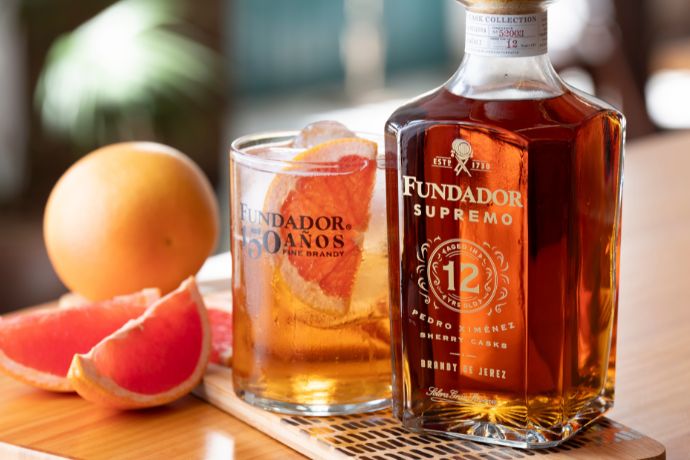 November 14, 2025 2:28 pm
November 14, 2025 2:28 pm
In the universe of great wines and Spanish flavors, hearing “designation of origin” is to immerse oneself in a world of authenticity, quality, and living tradition. This distinction, present in prestigious gastronomic products, is not just a guarantee: it is an invitation to discover the true character of a place and the art with which its treasures are made.
Join us to explore what the designation of origin means, its purpose, its requirements, some iconic examples in Spain and, of course, the relevance of Brandy de Jerez, one of the most admired wine prides – and the root of the Fundador spirit.
What is the designation of origin
The Designation of Origin (DO) is much more than a distinctive seal: it is a guarantee of authenticity, quality, and origin. This recognition is granted to certain agri-food products —such as wines, cheeses, oils, or liquors— whose identity is closely linked to a specific territory.
In other words, a designation of origin certifies that a product is born, made, and reaches its fullness in a specific land, under natural and human conditions that cannot be reproduced anywhere else. When a wine or food carries this seal, the consumer is certain that its quality, characteristics, and reputation are a direct result of its environment and the traditional know-how that defines it.
Spain has one of the oldest and most recognized winemaking traditions in the world. In this context, the Designation of Origin Jerez-Xérès-Sherry, created in 1933, marked a before and after: it was the first official DO of the country, a historical milestone that established the foundations of the current protection system for Spanish wines.
The function of the designation of origin
The designation of origin acts as a shield: it protects both those who create and those who enjoy. It ensures that each product respects traditional processes and uses local ingredients, but it also helps the consumer choose with confidence. Finding a DO is recognizing the effort, mastery, and passion behind each bottle or food.
Examples such as Rioja or Priorat (with qualified denomination DOCa) and, of course, Jerez-Xérès-Sherry, demonstrate how regulation, traceability and respect for origin can elevate a product to become an internationally recognized sensory and cultural experience.

What is the purpose of the designation of origin and what makes it unique?
Having a designation of origin not only distinguishes the product, but also gives it value and legitimacy. This seal turns each wine or food into an authentic expression of the territory, with an identity recognizable all over the world.
In the case of Jerez-Xérès-Sherry, its uniqueness lies in an exceptional balance between nature, history and technique. Its DO certifies that each glass contains the essence of a landscape, the influence of the west wind, the whiteness of the albariza and the patience of a breeding system that has no equivalent.
That’s why, when a wine bears the name Jerez-Xérès-Sherry, we are not only facing a product with a designation of origin: we are facing a masterpiece of Spanish oenology, a wine with soul, with a past and with a guaranteed future thanks to the strength of its tradition.
Benefits of the designation of origin
- Guarantee of authenticity: it certifies that the product comes from a specific area and is made following specific rules.
- Protection against imitations: it prevents the fraudulent use of the name or image of the product by third parties.
- Promotion of local development: it promotes rural economy and tourism, especially wine tourism, by associating the region with products of excellence.
- Preservation of cultural and gastronomic heritage: it protects traditional production methods and knowledge passed down from generation to generation.
Requirements to obtain the designation of origin
For a product to achieve this recognition, it must meet strict conditions, such as:
- Precise geographical delimitation: it can only be produced within a specific area.
- Own characteristics: the climate, the soil and the local varieties must directly influence the quality of the product.
- Controlled production methods: the processes must respect local tradition and meet the standards defined by the Regulatory Council.
- Regular quality controls: each batch undergoes analysis and tastings that guarantee its excellence.
In summary, a product with a designation of origin is a guarantee of quality and provenance, backed by a rigorous certification system.

Examples of designation of origin in Spain
Spain is one of the countries with the highest number of designations of origin in the world, reflecting its gastronomic richness and geographical diversity. There are over 100 designations of origin for wines and dozens of food products with protected designation of origin, such as cheeses, hams or oils.
- Wines: Rioja, Ribera del Duero, Rías Baixas, Priorat, Jumilla, Toro, La Mancha, or Jerez-Xérès-Sherry.
- Olive oils: Baena, Priego de Córdoba, Sierra Mágina, Les Garrigues.
- Cheeses: Manchego, Idiazábal, Cabrales, Mahón-Menorca.
- Other products: Pimentón de la Vera, Jamón de Huelva, Turrón de Alicante or Sidra de Asturias.
Each autonomous community has its own DOs that reflect the essence of its territory. In Andalusia, for example, Jerez-Xérès-Sherry, Manzanilla-Sanlúcar de Barrameda and Montilla-Moriles stand out; in Castilla y León, Ribera del Duero and Rueda; in Galicia, Rías Baixas; and in Catalonia, Priorat and Penedès.
These designations not only identify the product, but also invite enological and gastronomic tourism, allowing visitors to discover the culture and landscape of each region.
Difference between designation of origin and protected geographical indication
A common doubt among consumers is what is the difference between designation of origin (DO) and protected geographical indication (PGI). Although both seals protect products linked to a territory, they do not mean the same thing.
- Designation of origin (DO): requires that all stages of production, transformation and processing take place in the delimited geographical area. That is, the product is born and is entirely made in that territory.
- Protected geographical indication (PGI): is a more flexible category. It is enough that one of the phases takes place in the geographical area.
Therefore, the DO implies a stronger and complete link with the territory, while the PGI recognizes a significant, but not total, relationship.
Both systems share the goal of preserving authenticity and protecting the reputation of traditional European products.

The Denomination of Origin Jerez-Xérès-Sherry: pioneer and guarantor of quality
Our Brandy de Jerez is produced in the Marco de Jerez, which houses the DO Jerez-Xérès-Sherry, the oldest in Spain. This historical link ensures that every bottle we produce reflects not only centuries of tradition, but also internationally recognized excellence.
The Denomination of Origin Jerez-Xérès-Sherry: pioneer and guarantor of quality
The DO Jerez-Xérès-Sherry not only certifies an origin; it controls the entire process of making its famous fortified wines. From the origin of the grape —exclusively from the Marco de Jerez— to the traditional methods of aging under flor and the system of aging in criaderas and soleras, each phase is regulated and supervised by the Regulatory Council.
This certification system acts as a guarantor of authenticity, verifying the complete traceability of the product: the raw material, the winemaking techniques, the maturation process and the final sensory profile. Nothing is left to chance.
Each bottle protected by the DO Jerez-Xérès-Sherry is a reflection of centuries of winemaking experience, a perfect balance between the Atlantic climate, the albariza soils and the wisdom of the Jerez wineries.
Therefore, the Jerez-Xérès-Sherry seal is not just a geographical denomination; it is a symbol of excellence, tradition and international prestige. Possessing this DO means that the wine has passed the strictest quality controls, preserving intact the essence of one of the most emblematic wine regions in the world.
Fundador and the legacy of Brandy de Jerez
Fundador, pioneer and benchmark, produces its spirits in the heart of this territory, rigorously complying with all the requirements of the Regulatory Council. Our essence: to respect tradition, to bet on quality and to always move forward with innovation. The link with Sherry and the Harveys brand underlines the authenticity of the Fundador project, merging the Jerez heritage with the art of living and creating great experiences.
Related posts
This post was written by Almudena Alonso





Comments are closed here.